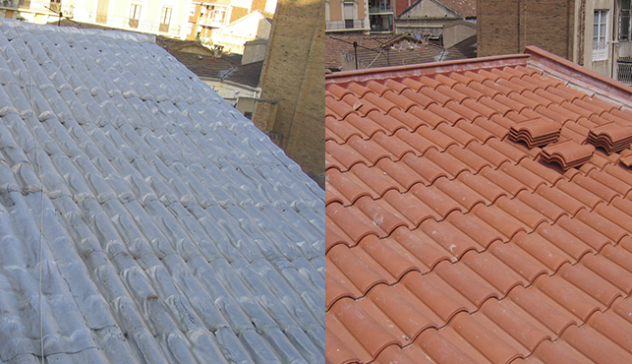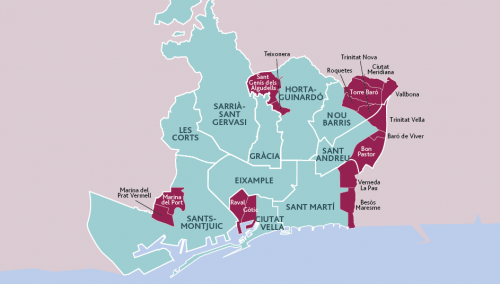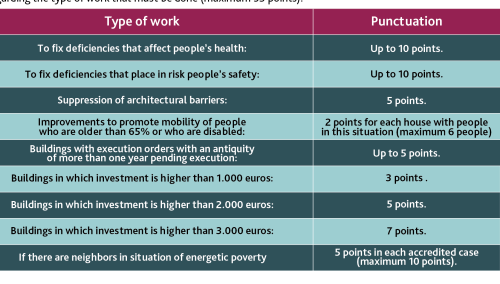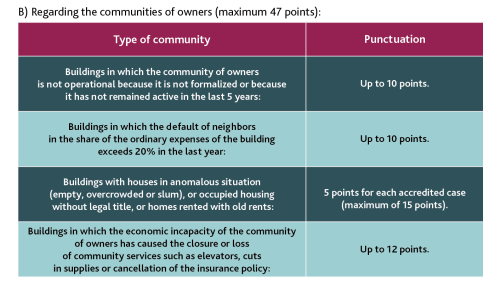
The buildings that are most vulnerable and most in need of renovation have a specific line of grants at their disposal.
Grants for those who need them most
An innovative programme to reduce inequality
The call for renovation grants in 2018 includes a special programme for buildings that, due to their socioeconomic complexity, often lie beyond the scope of ordinary calls.
Aware that renovation grants were often failing to reach the most vulnerable areas, the City Council decided to launch this initiative within the Neighbourhoods Plan, a programme that aims to reduce the inequalities that exist in the city.
Before launching the programme, the City Council commissioned the Polytechnic University of Catalonia to carry out a study of the buildings in the greatest need of renovation. This work has been reflected in a map of residential vulnerability, which indicates the areas where action should be taken.
With this information in hand, the City Council has designed a proactive renovation plan for high-complexity buildings. City Council technicians visit these buildings and speak with the people who live there to explain how the initiative works and assess the state of the building and the needs of its residents.
Once the City Council and the residents come to an agreement on the renovations to be carried out, the funding is processed and the work is done. Throughout the process, municipal employees carry out parallel work that combines socio-community intervention and renovation.
In this way, the City Council wants to ensure that renovation grants reach the people who need them most and contribute to improving their quality of life.
Highlights
Related links
Do you want to know how to apply for a renovation grant for a high-complexity building?
In these drop-downs you will find the general requirements and relevant specifications. They also include the various application and processing procedures. The application can be submitted at any of the Housing Offices of Barcelona.
Who can apply for a grant?
This grant can be applied for by communities of owners of residential buildings that meet the following requirements:
- Were built before 1993.
- Are multi-family buildings divided into a horizontal property regime, in which there is no concentration of ownership greater than 30% of the total number of units located on floors above the ground floor.
- That 60% of the building, excluding the ground floor and basement, is intended for habitual residence.
- That renovations have not been done on the common elements of the building in the last 15 years, and that these elements are in a poor state of conservation or require important functional improvements. For the renovation of common elements, they must improve the entirety of two of the following architectural elements of the building: roofs, dividing walls, structure, facades or lift. It is up to the management team to decide which elements will be improved.
- Buildings that are located on the map of residential vulnerability can benefit from this programme.

What are the programmes and grants?
Structural problems
General grant: For 35% of the protected budget, for a maximum of 30,000 euros.
Supplementary grant: For 40% of the protected budget without limit. Plus, if applicable, the excess of the general grant limit, until reaching the amount corresponding to the full percentage of the grant.
Non-structural renovations
- Facades
General grants: The maximum grant is 25% of the protected budget, with a limit of 30,000 euros per renovation action.
Supplementary grant: A grant for 25% of the protected budget without limit. Plus, if applicable, the excess of the general grant limit, until reaching the amount corresponding to the full percentage of the grant.
If the renovation involves energy improvements, what is established in the section "Passive actions: courtyards, facades, rooftops and dividing walls" shall apply.
- Courtyards, interior patios, rooftops, dividing walls, stairways and foyers.
These renovations will be carried out in accordance with what is established in the section "Passive actions: courtyards, facades, rooftops and dividing walls."
If it is technically impossible to fulfil the technical requirements established in the previous point, or to protect historic value, the same grant as in the "Facades" section shall apply.
Renovations for accessibility
- Lift installation
The buildings must have at least the ground floor plus three additional floors.
General grant: The maximum grant is 35% of the protected budget, with a maximum of 30,000 euros per renovation action.
Supplementary grant: The grant is 40% of the protected budget without limit. Plus, if applicable, the excess of the grant limit of the call for common elements, until reaching the amount corresponding to the full percentage of the grant.
For buildings included in the 2008 agreement (BV), this percentage is based on the main grant, for a maximum of 75% of the total grants. Plus, if applicable, the excess of the grant limit of the call for common elements, until reaching the amount corresponding to the full percentage of the grant.
- Removal of architectural barriers
General grant: The maximum grant is 25% of the protected budget, with a limit of 30,000 euros per renovation action.
Supplementary grant: The grant is 25% of the protected budget without limit. Plus, if applicable, the excess of the general grant limit, until reaching the amount corresponding to the full percentage of the grant.
Renovation of facilities
- Common general facilities
- Unification of television antennas
- Reordering of air conditioning units
- Fire prevention installations
For these programmes:
General grant: The maximum grant is 25% of the protected budget, with a limit of 30,000 euros per renovation action.
Supplementary grant: The grant is 25% of the protected budget without limit. Plus, if applicable, the excess of the general grant limit.
- Removal of obsolete asbestos cement elements
For the removal of any asbestos cement element that does not involve replacement of the element:
- General grant: The maximum grant is 25% of the protected budget, with a limit of 30,000 euros per action.
- Supplementary grant: The grant is 25% of the protected budget without limit. Plus, if applicable, the excess of the general grant limit until reaching the amount corresponding to the full percentage of the grant.
If the removal of the element requires replacement with suitable materials, the action will be integrated into the corresponding programme (e.g. if the action is for rooftops, it will be integrated into the programmes "Passive actions: courtyards, facades, rooftops and dividing walls" or "green rooftops"; and if it is for facilities, it will be integrated into the "Common general facilities" programme).
- Water supply
- General grant: The maximum grant is 40% of the protected budget, with a maximum of 60,000 euros per action.
- Supplementary grant: The grant is 25% of the protected budget without limit. Plus, if applicable, the excess of the general grant limit until reaching the amount corresponding to the full percentage of the grant.
Energy saving and sustainability
- Passive actions: courtyards, facades, rooftops and dividing walls
For all renovations involving overall energy improvement that act primarily on the exterior of the building and on improving energy performance according to the terms provided in the technical specifications. The grant is as follows:
- General grant: The maximum grant is 40% of the protected budget, with a limit of 30,000 euros per action.
- Supplementary grant: The grant is 35% of the protected budget without limit. Plus, if applicable, the excess of the general grant limit, until reaching the amount corresponding to the total grant percentage.
If only partial actions are carried out, the grant is as follows:
- General grant: The maximum grant is 25% of the protected budget, with a limit of 30,000 euros per renovation action.
- Supplementary grant: The grant is 35% of the protected budget without limit. Plus, if applicable, the excess of the general grant limit, until reaching the amount corresponding to the total grant percentage.
For partial actions, it is possible to act upon the entirety of the full and empty construction elements for which the action is carried out. In the general grant, if only acting on full or empty elements by applying energy improvements in accordance with the technical specifications, the action of the energy improvement must benefit from the grant foreseen in this section. The general grant provided for this section is 25%.
The performance of an energy audit shall receive a grant for 100% of the cost, provided that some of the actions included in the audit are carried out.
These actions must meet the energy requirements established in the technical specifications.
- Active actions
For all actions that involve the reduction of energy consumption through the production of energy with sustainable sources, the grant is as follows:
- General grant: The maximum grant is 50% of the protected budget, with a limit of 3,500 euros per home.
- Supplementary grant: The grant is 25% of the protected budget without limit. Plus, if applicable, the excess of the general grant limit.
Individual actions for energy production can receive grants for the same amount. In this case, it may be necessary to present the authorisation of the community of owners for the use or occupation of common spaces for individual benefit.
These actions must accredit a maintenance contract with control systems effective for a minimum of four years.
When the project is developed, the cost of the project or the technical report will be 100% subsidised, up to a maximum of 5,000 euros.
- Green rooftops
Actions which transform 50% of the rooftop surface into a green rooftop, excluding skylights and interior patios, are considered to be in accordance with the terms established in the technical annex of these bases. In addition, it will be necessary to improve the existing rooftop elements of the building.
The grant is the following:
- General grant: The maximum grant is 40% of the protected budget, with a limit of 30,000 euros per action.
- Supplementary grant: The grant is 35% of the protected budget without limit. Plus, if applicable, the excess of the general grant limit, until reaching the amount corresponding to the total grant percentage.
How is the grant applied for?
Application for the grants available through this call is structured into two phases:
1 – Advising and support to the community of owners
This phase will begin with a request presented by the interested community of owners to sign an agreement between the representative of the community of owners and the management of the Housing Consortium of Barcelona.
2 - Drafting of the basic project and execution of the work
Applications for registration and funding will be formalised by the signing of a second agreement between the representative of the community of owners and the management of the Housing Consortium of Barcelona. In order to formalise this agreement, it is essential that the advising and support phase mentioned above has been completed and that the members of the community of owners are, as a whole, considered to be vulnerable.
To be considered as beneficiaries of the grants and funding provided in this call and to sign with the Housing Consortium of Barcelona the agreement envisaged in "Drafting of the basic project and execution of work", the community of owners must obtain a minimum score of 50 points in the application of criteria included in the tables:
When is the application period for the funding?
This grant is not available. The period for signing the agreement and submitting the application for registration and grants corresponding to this call was opened until December 31, 2019.
The notice of the end of construction must be submitted within 60 days from the date on which the end of construction is certified, and must be accompanied by the necessary documentation.
Additional information
Given that this benefit is a public subsidy and involves capital income, the beneficiary must present his/her personal income tax declaration (IRPF), which must include the amount received.






